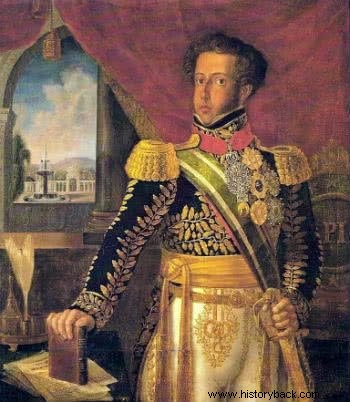The Brazilian Constitution of 1824 was granted by Dom Pedro I on March 25, 1824.
The first Brazilian Constitution guaranteed territorial unity, instituted the division of the government into four powers and established the census vote (vote linked to the citizen's income).
It was prepared by a small group due to disagreements between the Emperor and the National Constituent Assembly.

D. Pedro I with the copy of the Brazilian Constitution of 1824. Manuel de Araújo Porto Alegre. 1826.
Historical Context
After the proclamation of independence and the acclaim of Dom Pedro I as Emperor of Brazil, the country needed to organize its political and administrative structure.
It is important to remember that there were still Portuguese troops fighting in Bahia and this combat would only end on July 2, 1823.
For this purpose, the National Constituent Assembly was convened with deputies from different provinces of Brazil.
In the speech he made during the opening of the Constituent Assembly, Dom Pedro I reminded the deputies that they needed to do:
Characteristics of the Constituent Assembly
Portuguese Party or “conservatives” , which brought together Portuguese and Brazilians. They defended a centralized monarchy, little provincial autonomy and maintenance of their economic and social privileges.
Brazilian Party or "liberals" , formed by Brazilians and Portuguese. They wanted greater autonomy for the provinces, they defended the parliamentary monarchy and the maintenance of slavery.
Liberal-Radical Party – composed of the urban middle classes who advocated economic and political liberalism. Some of its members even wanted the establishment of the republic.
To reconcile these three visions of State, it is necessary to understand the role of José Bonifácio, Minister of Foreign Affairs. Since independence, Bonifácio sought to create a strong, constitutional and centralized monarchy. In this way, the fragmentation of the country, as happened in Spanish America, would be avoided. Equally, he intended to abolish the slave trade and slavery.
Due to the growing disagreements between the deputies and the Emperor, the latter orders the Army to close the Constituent Assembly. Several deputies were arrested, including José Bonifácio, who went into exile with his family.
In the following weeks, D. Pedro I summons a group of ten people to form the Imperial Council and to elaborate the Magna Carta.
Constitution Granted x Enacted
Although the Constitution is the guarantee of the individual rights of citizens, not all are written in the same way.
There are Constitutions that are drafted by a democratically elected National Constituent Assembly. In this case, we say that the Magna Carta has been enacted.
However, there are Constitutions that are made by a small group of people. In this way, the Constitution was granted, that is, imposed by the Executive Power on the country, as was the Constitution of 1824.
Characteristics of the Constitution of 1824
- the regime of government established was the hereditary monarchy.
- Existence of Four Powers:Executive Power, Legislative Power, Judiciary Power and the Moderating Power.
- The Moderating Power, exercised by the Emperor, gave him the right to intervene in the other powers, dissolve the legislative assembly, appoint senators, sanction and veto laws, appoint ministers and magistrates, and depose them.
- Executive Power:exercised by the Emperor who, in turn, appointed the presidents of provinces.
- Legislative Power:It was composed of the Chamber of Deputies and the Senate. Deputies were elected by census and senators were appointed by the Emperor.
- Judiciary:Judges were appointed by the Emperor. The office was for life and could only be suspended by sentence or by the Emperor himself.
- Right to vote:for free men, over 25 years old, with an annual income of more than 100 thousand réis, it was allowed to vote in primary elections where those who would vote for deputies and senators were chosen.
- For his part, to be a candidate in the primary elections, the income rose to 200 thousand reis and excluded the freedmen. Finally, candidates for deputies and senators must have an income of more than 400 thousand réis, be Brazilian and Catholic.
- Established Catholicism as the official religion of Brazil. However, the Church was subordinated to the State through the Padroado.
- Creation of the Council of State, composed of ten councilors chosen by the Emperor.
- The capital of independent Brazil was Rio de Janeiro which was not subject to the Province of Rio de Janeiro. It had its capital in the city of Niterói.
Learn more about census voting
Conclusion
The Constitution of 1824 lasted 65 years and to this day is the longest in force in Brazil.
Except for the Additional Act of 1834, no significant changes were made to the text of this Constitution.
Constitution of 1824 - All MatterRead more :
- Brazilian Constitutions
- Constitutional Monarchy
- The arrival of the Royal Family to Brazil
